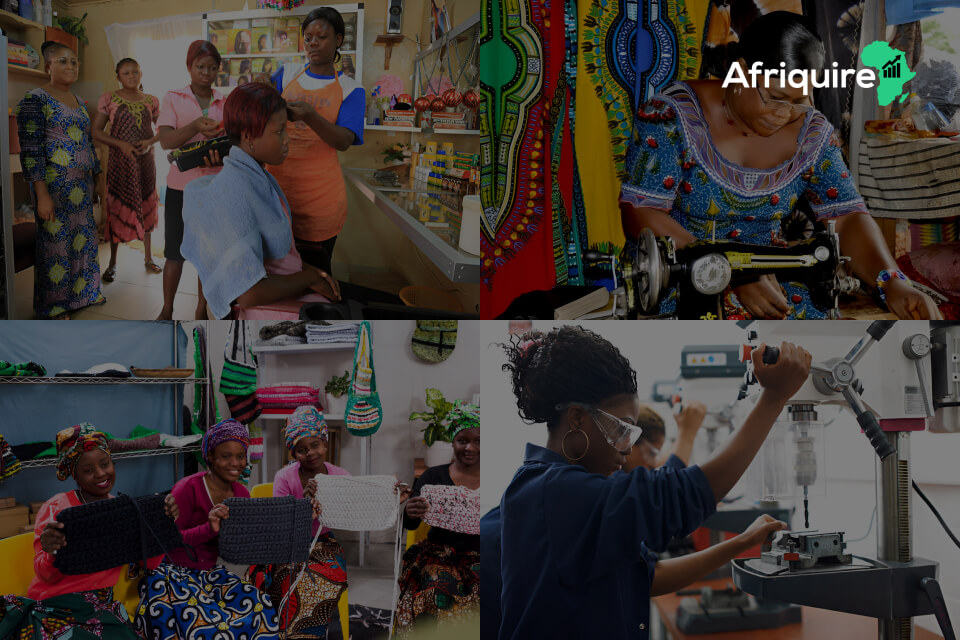Introduction
Have you ever wondered why African women face more challenges when starting their businesses? It’s not always about money or skills—often, the most significant obstacles come from cultural barriers in African women’s entrepreneurship. In many societies, traditional beliefs dictate that a woman’s primary role is to care for her family or manage the household, not to run a business. These societal expectations limit opportunities and discourage many women from pursuing entrepreneurship. How do these cultural barriers impact their journey, and can we break them down to create a more inclusive business environment for women? Let’s discuss.
Overview of Entrepreneurship Among African Women
Entrepreneurship among African women is experiencing rapid growth. Many women are launching their businesses across various sectors, such as fashion, food, and technology. This trend is significant as it enables them to generate income and support their families. In Nigeria, for instance, women are using social media to market their products and connect with a broader customer base. They are also participating in groups where they can exchange ideas and provide mutual support. This collaboration enhances their strength and success.
Nonetheless, challenges remain. Some women encounter obstacles like securing funding to start their businesses and juggling work with family responsibilities or societal and cultural expectations. However, many are discovering innovative ways to tackle these challenges through creativity and perseverance. In summary, entrepreneurship among African women serves as a powerful means for them to transform their lives and positively impact their communities.
Importance of Addressing Cultural Barriers
Cultural barriers constitute one of the biggest obstacles for African women in business. The majority of people still believe that a woman should spend most of her time taking care of her family instead of building a business. This can make it difficult for women to focus on business goals.
Also, in some cultures, women are encouraged not to do specific jobs, especially to work in male-dominated fields like technology or engineering. Because of this, they miss many opportunities. If we want more women to succeed in business, we must change these attitudes.
The Impact of Cultural Norms on Women’s Economic Participation
Women in most African homes are expected to do most of the housework and childcare. This gives them little time to focus on their business. Also, the majority of women do not get a chance to get education or training, which renders them unable to gain business skills.
If we remove these challenges, there will be a better chance for women to balance family and business, which will enable them to prosper.
Purpose of the Discussion
This discussion is on how to remove cultural barriers to African women’s entrepreneurship. Once we are aware of these challenges, we can find solutions. The following are some of the things that we can do:
- Make more finance available to women to set up and grow their businesses.
- Set up women’s business networks to allow them to link, learn, and mentor each other.
- Challenge cultural assumptions which keep women from entering business sectors.
- Foster gender equality so that women can have the same business opportunities as men.
To truly empower women to be successful in business, we must remove cultural obstacles. This includes giving them education, training, and support. We need to have a business climate in which women can feel safe and encouraged to grow.
Understanding and Navigating Cultural Norms
Definition of Cultural Norms in Different African Societies
Cultural norms are the unwritten rules which govern how people are expected to behave in society. In the majority of African cultures, these norms prescribe the roles of men and women. For example, women are supposed to put family responsibilities first before business. This is one of the challenges facing women entrepreneurs, making it difficult for them to own businesses. To succeed, women need to be knowledgeable about these norms and know how to work around them.
How Traditions and Gender Roles Shape Entrepreneurial Opportunities
In the majority of African cultures, gender roles and traditions dictate the type of opportunities that women may have. Most women are expected to take care of the home and raise children, leaving them with limited time for business. Some are not afforded the chance to go to school or learn business skills, which makes it harder for them to become successful entrepreneurs or businesswomen.
3 Common Cultural Barriers
Here are 3 common cultural barriers that prevent women from scaling their businesses are:
- Limited Mobility: Women in certain cultures are not allowed to move around freely or attend business meetings without permission.
- Family Expectations: Women are expected to be fully obligated to their families. The majority of women have to put family duties ahead of their businesses. There are limits to how long they can leave their family or go on business trips.
- Social Perception: It is seen by some that there are businesses that are men’s, hence making it hard for women to enter into such types of businesses.
4 Strategies for Working within Cultural Boundaries while Fostering Change
In spite of these barriers, women can still succeed in business by employing the right strategies. The following are 5 strategies to work within cultural norms and yet change them:
- Education and Awareness: Raising awareness about the benefits of women-owned businesses can change attitudes and lead to more support.
- Support Networks: Creating women’s business networks allows women to share ideas, get mentorship, and support each other.
- Flexible Business Models: Encouraging businesses that allow women to balance work and family, like home-based or part-time businesses, can make entrepreneurship easier.
- Policy Reforms: Changing laws so that women have equal access to funding and business opportunities can eradicate some of these barriers.
In following these strategies, we can help women overcome cultural norms and become successful entrepreneurs.

Building Alliances with Community Leaders
Do you want to know how to partner with community leaders so that you can assist women entrepreneurs in overcoming cultural barriers in Africa? Let’s begin!
Role of Traditional and Religious Leaders in Shaping Cultural Perspectives
In the majority of African cultures, religious and traditional leaders have a large influence on what individuals believe and accept. They can shape opinion in terms of whether women should do business or work. When such leaders adopt women entrepreneurship, it can help shape negative mindsets and enable women to run viable businesses.
Importance of Engaging Community Leaders as Advocates for Women’s Entrepreneurship
Community leaders play a crucial role in fostering and promoting women’s entrepreneurship. Their support can significantly impact how the community views and accepts women in business, creating more opportunities and encouragement for aspiring female entrepreneurs. Local politicians, religious leaders, and influential business owners are community leaders who significantly shape public opinion and social norms.
When these figures actively support and advocate for women’s entrepreneurship, it conveys a strong message that women in business are appreciated and respected. This can help dismantle the stereotypes and obstacles that women frequently encounter when starting and expanding their businesses. When community leaders advocate for women entrepreneurs, it motivates others in the community to do the same.
Case Studies/Examples of Successful Partnerships
Let’s look at some examples:
- The African Women’s Entrepreneurship Program (AWEP) has partnered with community leaders to empower and train women in business. They provide mentorship and networking opportunities to help women grow their businesses.
- The Graça Machel Trust partners with organisations like Women Finance to support women entrepreneurs in several African countries. The program is dedicated to enabling African female entrepreneurs to thrive by offering crucial skills, resources, mentality, and company growth support.
3 Practical Steps to Build Trust and Gain Community Support
Here are 3 practical steps to gain trust and cooperate with community leaders:
- Speak Respectfully: Treat cultural traditions and values with respect when speaking with community leaders. This gains trust.
- Educate and Inform: Explain the benefits of women’s entrepreneurship, including the creation of jobs and the increase in the economy.
- Work on Projects Together: Work with community leaders on projects that benefit everyone, such as business training for women.
- Celebrate Successes: Share success stories of women entrepreneurs to encourage others and give more support.
By working together with community leaders, we can create a more supportive environment for women entrepreneurs in Africa. You can even form a women’s business group in your community to help and learn from each other.
Leveraging Education to Challenge Stereotypes
Did you know that education is applied to break stereotypes and empower women entrepreneurs in Africa? Let’s talk about how education can change lives!
- The Role of Formal and Informal Education in Changing Mindsets
Both formal (e.g., school and university) and informal (e.g., workshops and training) education play an important role in changing the manner of thinking among people. Formal education provides women with the skills and knowledge to make them successful businesspersons. On the other hand, informal education allows them to learn practical skills and build confidence.
For example, learning about gender equality reduces discrimination against female entrepreneurs. It teaches people that women can run businesses, too. When communities learn about women’s contribution to business, they become more supportive of female entrepreneurs.
- How Financial Literacy and Business Training Empower Women
Financial literacy and business training are crucial for women. They equip women with the skills to earn money, develop effective business plans, and make informed decisions. When women possess these abilities, they can secure funding to launch and manage their own businesses successfully. Understanding how to navigate opportunities and risks is equally important. Financially savvy women can expand their businesses and gain independence. With the proper education, they can tackle challenges and establish resilient enterprises.
In conclusion, financial literacy and business training provide women with the essential tools for success in the business landscape. This empowerment enables them to realize their aspirations and make a positive impact in their communities.
- The Impact of Mentorship and Capacity-Building Programs
Mentorship and capacity-building programs support women by offering them advice, motivation, and access to networks. These programs help them gain confidence, develop leadership skills, and gain advice on overcoming cultural barriers. When women entrepreneurs are guided, they can learn how to manage societal expectations and stereotypes. They are provided with access to training that helps them improve their entrepreneurial skills. These programs encourage women to join business groups and support each other.
- Government and NGO Initiatives Supporting Women’s Entrepreneurship
Governments and NGOs are formulating initiatives to empower women in business. These consist of providing education, training, funding opportunities, and promoting gender equality policies.
For example, the Cherie Blair Foundation offers mentorship and business skills development programmes for women entrepreneurs. These kinds of initiatives not only empower women but also inclusive-ize the business environment. They also collaborate with partners to eradicate barriers to entrepreneurship for women, enabling global economic gender equality.
By investing in education and subsidizing these programmes, we can help women in business succeed and shatter the stereotypes which have held them back for centuries. As goes the saying, empowered women empower women!

Promoting Success Stories and Role Models
Did you ever ask yourself how success stories can help women overcome cultural barriers to business? When we talk of women who are successful in entrepreneurship, we encourage others to chase their dreams. Let us see how it is possible!
- The Power of Visibility in Inspiring Change
Matters of visibility are important! When we expose stories of successful women entrepreneurs, it encourages other women to believe in themselves. Many young women face challenges in business because of cultural barriers, but seeing others succeed assures them that they can overcome them as well.
For example, Lionesses of Africa is a community that unites female entrepreneurs from throughout Africa. It is a social enterprise that is enthusiastic about women’s entrepreneurship in Africa and aims to empower startups. They share their stories and invite others to do so as well. Through these stories, we can inspire more women to think that success is possible.
- Showcasing Successful African Women Entrepreneurs
Let’s look at the achievements of successful African female entrepreneurs who have made a remarkable impact in their fields. These women exemplify how determination and hard work can help them break through cultural barriers and reach their goals.
One inspiring example is Jumoke Dada, the founder of Taeillo, who has built a thriving furniture business in Nigeria and Kenya. She has shown that women can excel in industries traditionally dominated by men. Another prominent figure is Folorunso Alakija, a Nigerian businesswoman and philanthropist, who serves as the group managing director of The Rose of Sharon Group and the executive vice chairman of Famfa Oil Limited. Additionally, she runs a foundation that supports various charitable causes.
These narratives illustrate that women can thrive as entrepreneurs and play a vital role in economic growth. They highlight that with determination and hard work, women can navigate and overcome cultural obstacles to achieve their aspirations. Their success stems from their unwavering focus and motivation, even when faced with difficulties. The journeys of these accomplished African female entrepreneurs showcase the strength of determination and hard work. They encourage women to have faith in themselves and their capabilities, urging them to chase their passions with confidence.
- Media, Storytelling, and Social Platforms as Tools for Advocacy
Social media and news outlets are great ways of sharing these success stories. We can encourage more young women to be entrepreneurs using Instagram, Facebook, and Twitter.
Sharing stories of women’s struggles and success makes them relatable and inspiring. When people get to view real examples of women entrepreneurs, they shift their perceptions and become more inclined towards support of women in business.
Also, as the media show more women as business leaders, they help break down stereotypes and reduce cultural barriers.
- Encouraging Peer-to-Peer Support and Mentorship Networks
It is very important to have a support system. Successful women can help others by being mentors and creating peer-to-peer networks. Starting groups for women in business can make it easier for them to share ideas and find new opportunities. These groups can also provide funding that helps women grow their businesses faster. When we build strong support networks, we can help more women achieve their dreams and overcome challenges in starting their own businesses. Having someone to guide you or share experiences can make a big difference. It is all about working together and lifting each other up.
By joining these groups, women can learn from each other, gain confidence, and find the resources they need to succeed. This way, everyone benefits, and we create a community where women feel empowered to take on the world of entrepreneurship. Sharing success stories and role models is one of the best ways to inspire and enable women entrepreneurs. By sharing these stories and building supportive networks, we can help break down cultural barriers and provide more opportunities for women in business.

Frequently Asked Questions (FAQs)
1. What are cultural barriers?
Cultural barriers refer to the differences in beliefs, values, and practices that exist between various groups of people. For African women entrepreneurs, these barriers may manifest as traditional gender roles or expectations that restrict their business endeavours.
2. Why do cultural barriers affect women entrepreneurs?
Cultural barriers can hinder women from starting or expanding their businesses. They may encounter discrimination or a lack of support from their families and communities due to their gender.
3. How can education help overcome these barriers?
Education can play a crucial role in overcoming these barriers by equipping women with the necessary skills and knowledge to thrive in business. It also helps shift societal perceptions regarding women’s capabilities.
4. What role does mentorship play?
Mentorship is vital as it links young female entrepreneurs with seasoned businesswomen who can offer guidance and valuable insights.
5. What strategies can be used to challenge stereotypes?
To challenge stereotypes, women can highlight successful female entrepreneurs through media and community events, demonstrating that they are capable of excelling in the business world.
Conclusion
In conclusion, addressing cultural barriers in African women’s entrepreneurship is crucial for their success. It’s important to recognize that these barriers often stem from traditions, beliefs, and family expectations. Women require support from their families and communities to pursue their aspirations. Education is also vital; when women acquire business skills, they gain the confidence needed to launch their own ventures.
Networking plays a significant role as well. By connecting with fellow women entrepreneurs, they can exchange ideas and experiences, which helps them feel less isolated and more empowered. Mentorship programs can offer guidance through challenges and provide valuable insights.
Additionally, governments and organizations should implement policies that support women in business. This includes ensuring access to funding and resources that can facilitate the growth of their enterprises. When women thrive in business, it benefits everyone by generating jobs and enhancing the economy.
Lastly, we should celebrate the accomplishments of African women entrepreneurs. Their stories motivate others to overcome challenges and follow their dreams. By collaborating as a community, we can dismantle these cultural barriers and pave the way for a brighter future for all women in Africa.



